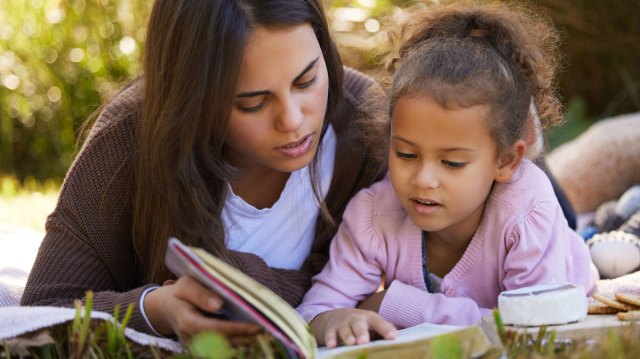I have a confession to make: bedtime reading barely happens in my house. After working at a stressful job, juggling side hustles to pay down debt, commuting for hours to pick up kids at distant schools, cooking, checking homework, checking in on elderly relatives, and attempting coherent conversations with my family, I’m just—done. We don’t read a lot on weeknights. But we’re a family of readers.
I’m a school librarian, owner of thousands of books, and a graduate-level instructor of children’s literature. All of my experiences tell me that there are countless ways to raise readers and no one-size-fits-all approach. I’m not a huge fan of required summer reading lists either since each child has radically differing learning and literacy needs.
Related: Ditching That Summer Reading List Is Actually a Fantastic Idea
When I only had one daughter and one job, we read for almost an hour every night. But now, with two kids and two jobs, I read the shortest books possible in less than 10 minutes. Goodnight Moon by Margaret Wise Brown only contains 132 words—part of the reason it has consistently remained among the most popular children’s books for 75 years. When all of our family structures, economic circumstances, and schedules vary so widely, why do we feel pressed to read to our kids the same way? What if you work nights? Does that mean your kid doesn’t read with you? Nope! You read whenever and however you can.
My current nighttime routine with my 3-year-old includes songs, cuddles, nonsensical chats (“Are you a bear or a bee?”), and the grand finale, “the airplane” where I swoop her through the air and dump her, giggling, into the bed. My 10-year-old would still like me to read to her at night—and not honoring this request hurts. But so does sleep deprivation. So my older one gets read-alouds in binge sessions, usually when the sun is high in the sky. We’ve been chipping away at Little Women, the original, 800-page version for two years.
So much of the conventional wisdom about parenting derives from dated, sexist thinking. When I perused academic articles about bedtime reading, I kept seeing the words “mother” and “maternal” everywhere—as if reading, like cooking and housework, were exclusively feminine activities. People of all genders can read aloud, and at all times of day.
When I’m mechanically reading the Frozen II Little Golden Book for the 300th time, I yearn to be anywhere else, even at the DMV. If parents read a truly great book to their kids, like The Snowy Day by Ezra Jack Keats or Each Kindness by Jacqueline Woodson, and have a total blast doing it—even just once a week—I believe it’s more meaningful than vitamin-swallowing nightly reading. Regular reading is important, of course, but nighttime isn’t best for everyone.
Digging deeper into the most recent research, I read a summary of Larissa K. Ferretti and Kristen L. Bubs’ 2017 study on bedtime. Drawing from data from 3,250 families, they sought to understand what kids need for healthy brain development, social-emotional skills, and school readiness. Their findings in Early Education and Development suggested that dependable bedtime routines are what matter. Bonding, stimulating activities, and sufficient wind-down for sleep—that’s the ideal. Reading can be part of this but so can other activities. A scientist mom friend of mine says she does Bedtime Math with her kids. After all, why do we only equate nighttime with literacy?
Let me leave you with some advice. Forge your own path through bedtime with confidence and tweak it when needed. Read, but do it your way. Here are some that have worked for us.
- Read books on public transportation, or listen to audiobooks or podcasts like Story Pirates while driving. Talking about what you read (or hear) is so important.
- Pack books for long waits in the pediatrician’s office.
- Go on reading outings to new libraries, bookstores, and even parks with Little Free Libraries.
- Read for ten minutes every morning for a coffee and Sippy cup date while snuggling in bed.
Who knows, maybe breakfast book-time will become the next big thing?
Jess deCourcy Hinds (jessdecourcyhinds.com) is a writer, librarian, and graduate-level children’s literature instructor. Sign up for her free quarterly newsletter, I’m an Open Book: On Love, Libraries and Life-building.











